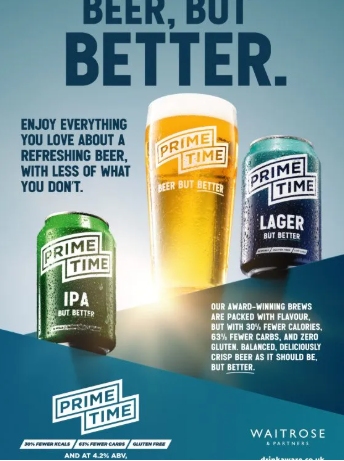In a series of sensible (and perhaps, depending on your views, puritanical) rulings, the ASA has honed in on complaints against a number of ads promoting cosmetic surgery, alcohol and gambling.
As they maintain their stern stance on the promotion of vices, those hoping to recreate Kim K's 2014 PAPER cover* may be out of luck. For advertisers, the ASA is clear - pick your poison, but suffer the consequences if you fail to comply with the CAP Code.
*Note: Viewer discretion advised - if you are not familiar with this photo shoot, we suggest you do not use your work device to run an image search...
Oh, beer - trouble brewsfor alcohol brands
Ads for Prime Time Lager and VK Blue were found to be in breach of the CAP Code this week.

The former, seen on the side of a bus in October 2024, made a series of health claims, stating that the drink, with "63% lower carbs", was "next level taste, easy on the waist". A third claim - "and at 4.2% ABV, why wouldn't you?" - implied, in the complainant's mind, that the drink was preferable due to its alcoholic content.
Prime Timeexpressed surprise at the complaint, explaining their external agency had clearance from their legal teams. We're tempted to make some cheap comments about how they need to get some different legal advisors, but we're better than that, so we won't (even though they should).
Three claims issues were investigated - and upheld - by the ASA. The key issue was linking alcohol consumption to weight loss; the ASA explicitly prohibits health, fitness or weight control claims in ads for alcoholic drinks, and the inclusion of a permitted claim ("30% fewer kcals") inadvertently highlighted the non - permitted claims. This, in combination with the claim that lager may be preferred due to its alcohol content, only reinforced the ASA's belief that the ad should be taken down.
Separately, a paid-for Instagram story posted by @vkdrink targeted those committed to 'Dry January', downplaying the impact of breaking New Year's resolutions - "Doing Dry January? One won't hurt, right? [winking face emoji] "and urging them to "Pick up a 70cl bottle of VK Blue at B&M for just £1.99 and keep the party going into January!".
While the brand argued that the ad did not suggest alcohol could help overcome boredom and did not target, the ASA found issue with the phrase, "keep the party going". In their ruling, they stated that the "fundamental purpose" of the ad was to tempt those taking part in Dry January to drink alcohol to alleviate the boredom of vulnerable users - a message which clearly lacks social responsibility.
Retired cricketer deemed a safe bet
Thankfully, gambling platform Fitzdares - a shining beacon of hope in a shadowy sea of upheld rulings - demonstrates how brands can promote riskier products in a compliant way.

In a post on Stuart Broad's X page, he promoted his partnership with Fitzdares, an online betting platform. A complainant challenged that Mr Broad was likely to be of strong appeal to young people due to his status as a sports star.
Indeed, previous rulings have held that ads for gambling services featuring sportsmen (such as golfer Jordan Spieth and footballer Luiz Suarez) were in breach of the CAP Code. However, both men were under 25 and active in their respective sports at the time the ads were published. The rules therefore did bite on them. Particularly on Mr Suarez.
A key factor in the ASA's decision was the fact that Mr Broad, aged 38, is retired (but not hurt). While CAP guidance states that prominent sportspeople involved in sports like cricket, which are of "high risk" of appealing to under-18s, those who don't have a significant role in the sport are of "low risk".
Concluding that the Ashes winner and former captain's role in the sport is insignificant seems a little callous on the face of it, but this judgement is largely based on metrics: it's undeniable that Mr Broad is an accomplished sportsman, but his social media data demonstrated that only 7,500 of his followers across all his accounts were registered as under 18 (although that's still two underage followers for each of this his 3,662 Test runs).
The ASA noted that his Facebook and YouTube profiles had been inactive for a number of years, he did not own Snapchat or TikTok accounts, and "his partnerships were predominantly with brands that were adult-oriented". So he wasn't caught out by his demographics.

The content of this article is intended to provide a general guide to the subject matter. Specialist advice should be sought about your specific circumstances.



